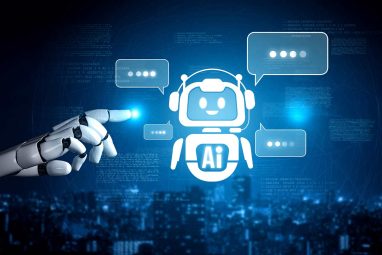Here’s How TCS and MIT SMR Aim to Redefine the Future of Enterprise AI
TCS is helping organizations embrace this shift through its AI platforms, including WisdomNext 2.0, now enhanced with agentic capabilities.
Topics
News
- Waymo Secures $16 Billion to Expand Robotaxi Operations Worldwide
- OpenAI, Snowflake in $200 Million Deal to Embed AI in Enterprise Data
- Musk Merges SpaceX and xAI in Deal Valued at $1.25 Trillion
- TASC Group Appoints New CEO To Lead AI-Driven Growth in the MENA Region
- What Is Moltbook? A New Social Network Built for AI Agents
- OpenAI May Secure $50B From Amazon in Ongoing Talks

[Image source: Chetan Jha/MITSMR Middle East]
As AI becomes central to enterprise strategy across the Middle East and globally, a new research series by Tata Consultancy Services (TCS) and MIT Sloan Management Review (MIT SMR) explores how AI is reshaping decision-making itself. Rather than simply improving efficiency, AI is evolving from a tool that supports decisions to one that actively architects decision environments—a shift that promises to redefine how enterprises operate at scale.
The study spans six sectors: Manufacturing; Retail and CPG; BFSI; Life Sciences and Healthcare; Energy, Resources and Utilities; and Communications, Media and Technology, and features insights from major organizations like Walmart, Meta, Mastercard, BT, and Pernod Ricard. It introduces the concept of Intelligent Choice Architectures (ICAs): AI systems that generate novel options, predict outcomes, and guide decision-makers, offering a new way to navigate complexity and uncertainty.
According to Michael Schrage, research fellow at MIT Sloan’s Initiative on the Digital Economy and report coauthor, ICAs “learn how to improve the environment in which decisions are made,” which marks a fundamental shift from analytics to architecture. This evolution, the study finds, is separating forward-looking companies from those still locked in traditional decision-making frameworks.
TCS has applied its global expertise in AI transformation to this research. Ashok Krish, Head of AI Practice at TCS, explained that ICAs help “build superior decision environments for complex multi-factorial situations,” resulting in more trackable and accountable outcomes. He added that ICAs also align talent strategies with business goals, helping organizations identify and nurture high-potential employees in the AI era.
In practical terms, the report highlights how ICAs are transforming industries:
- In retail, Pernod Ricard uses ICAs to quickly test and personalize campaign content, while Walmart applies them to identify and develop local talent across its stores.
- In manufacturing, companies like Cummins are simulating extreme scenarios with generative AI to improve powertrain design and accelerate product development.
- In financial services, Mastercard integrates ICAs across departments to uncover cross-functional insights, while Liberty Mutual’s LibertyGPT saved over 200,000 employee hours by summarizing complex information.
- In telecom, BT’s AI assistant, Aimee, now handles half of customer queries autonomously. Meanwhile, Meta’s ICA framework accelerates internal decision-making and product development.
- In healthcare, ICAs are streamlining drug discovery, reducing timelines by up to 30% and cutting costs by as much as 40%.
David Kiron, editorial director at MIT SMR, noted that “this isn’t AI as co-pilot—it’s AI and humans working together as architects,” creating decision environments that are more responsive, inclusive, and accountable.
TCS is helping organizations embrace this shift through its AI platforms, including WisdomNext 2.0, now enhanced with agentic capabilities. It was recently recognized by NVIDIA as the Rising Star Consulting Partner of the Year for AI innovation.
As ICAs gain traction, enterprises are being urged to rethink not only how decisions are made, but how choice itself is designed—a challenge that’s increasingly defining competitive advantage in the AI era.








